Consumer Bankruptcy Checklist

Once you have made the decision to file for consumer bankruptcy, it is important to be sure that you have all of the documentation you will need to file and that you have taken all necessary steps. Given that U.S. bankruptcy law is extremely complex, it is essential to work with a St. Petersburg bankruptcy lawyer from the start of your case. Your bankruptcy lawyer can make sure that your case goes as smoothly as possible and that all of the required materials are filed accurately and in a timely manner. By learning about the documents and tasks that are important in a consumer bankruptcy case, you can get the process going before you meet with your bankruptcy attorney. The following checklist identifies various considerations and steps you will need to take into account as you prepare for your bankruptcy case.
- Determine Your Eligibility
When you are planning to file for consumer bankruptcy, the first to-do item in any checklist is to determine your eligibility for the type of bankruptcy you are planning to file for in Florida. Debtors who are planning to file for Chapter 7 bankruptcy will need to find out whether they pass the “means test” to be eligible, while debtors planning to file for Chapter 13 bankruptcy will need to determine whether their current employment allows them to be considered a wage earner who is eligible for a reorganization bankruptcy.
- Identify Your Debt
Before you meet with your bankruptcy lawyer, you should identify all of your debt so that you can determine with your lawyer’s help if the debt is eligible for discharge. While most types of consumer debt are eligible for discharge through Chapter 7 or Chapter 13 bankruptcy, some types of debt will not be dischargeable. For the most part, common types of debt like credit card debt, medical bills, and personal loans are dischargeable. In some cases, it also may be possible to have your student loan debt discharged.
In addition to identifying all of your debt for purposes of determining dischargeability, it is also important to identify all of your debt for purposes of Chapter 13 eligibility (if you are planning to file for Chapter 13 bankruptcy). If you have more than $419,275 in unsecured debt or $1,257,850 in secured debt, you will need to file for Chapter 11 bankruptcy instead of Chapter 13 bankruptcy.
- Identify Your Assets and Their Exemption Status
Next, you should identify all of your assets in order to determine whether they are exempt. Florida law has generous bankruptcy exemptions, particularly when it comes to your home. You can exempt an unlimited amount of equity in your home. In addition, Florida has a variety of personal property exemptions, as well as exemptions for equity in a motor vehicle, for wages, for pensions and public benefits, and more.
Contact a St. Petersburg Bankruptcy Attorney
If you are planning to file for consumer bankruptcy, you should seek advice from one of our St. Petersburg bankruptcy lawyers today. Contact the Law Offices of Stephen Barszcz for more information about how we can assist you.
Source:
leg.state.fl.us/statutes/index.cfm?App_mode=Display_Statute&URL=0200-0299/0222/0222.html






